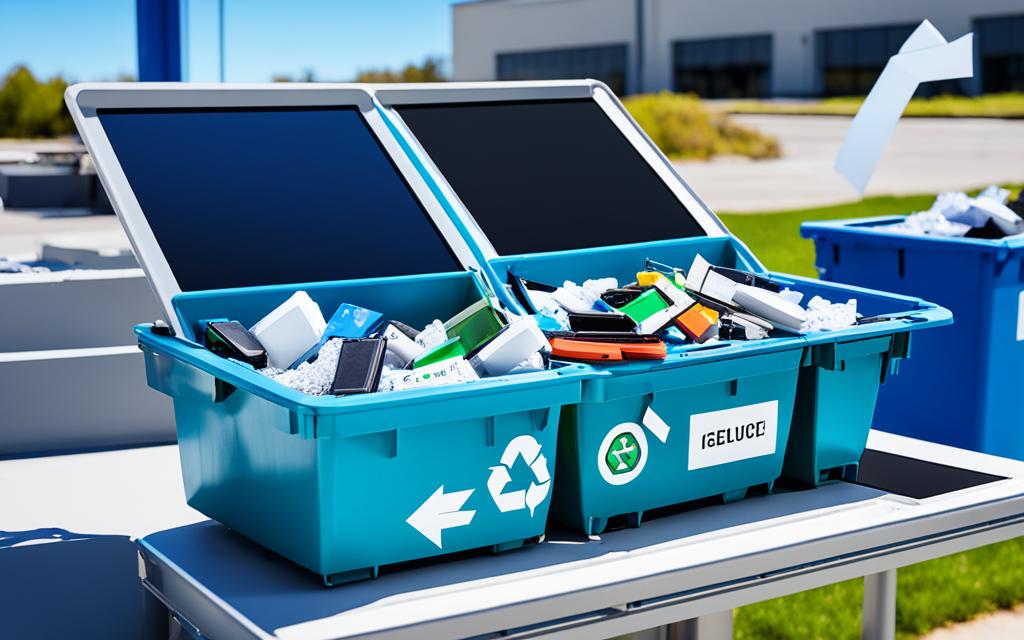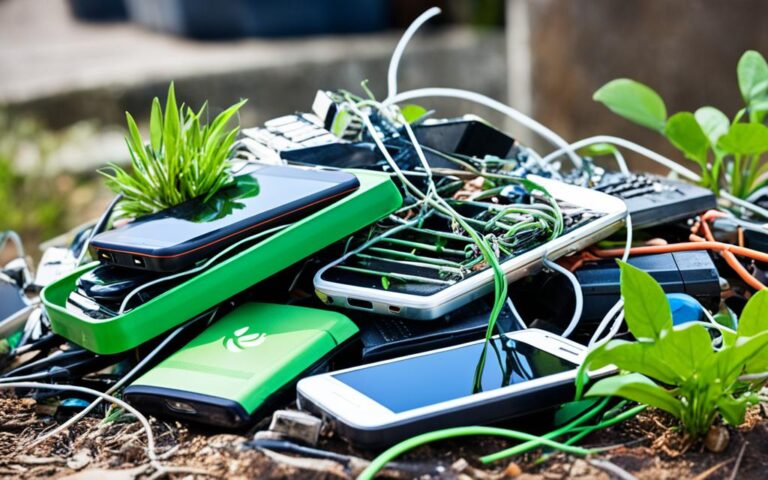How to Securely Wipe Your Data Before Recycling Your Phone
Before recycling or selling your old phone, it is crucial to securely wipe all your personal data to protect your privacy. Simply restoring your phone to factory settings is not enough, as it may still leave behind sensitive information. Identity theft expert Robert Siciliano found that even devices that were “wiped” still contained personal data. To ensure your data is completely erased, follow the steps outlined below.
Why Data Wiping is Important for Your Privacy
Data wiping is essential to protect your privacy and prevent identity theft. Simply deleting files or performing a factory reset may not completely remove your personal information. Studies have shown that it is possible to recover photos, emails, text messages, and other documents from a reset Android device. When you delete a file, the operating system only removes the file’s pointer and marks the sectors as available, making the data recoverable until it is overwritten. Therefore, it is crucial to follow proper data wiping procedures to ensure your personal data is irretrievable.
“Complete data removal is vital to safeguard the privacy of your personal information. Without secure data deletion, your sensitive data could fall into the wrong hands and be exploited for malicious purposes.”
Data wiping acts as the ultimate safeguard against unauthorized access to your personal data, offering privacy protection and peace of mind. By permanently erasing the traces of your personal information, you significantly reduce the risk of identity theft and ensure the utmost security for your sensitive data.
Proper data wiping goes beyond a surface-level deletion; it involves overwriting the existing data with random patterns, making it virtually impossible to recover. By following secure data deletion procedures, you can safeguard your privacy and ensure that your personal information remains confidential.
Protecting Your Personal Data
To protect your personal data and maintain privacy, it is crucial to thoroughly cleanse your device before parting ways with it. Whether you plan to recycle, sell, or donate your phone, following data wiping best practices ensures that your personal information remains secure.
The Consequences of Inadequate Data Wiping
Inadequate data wiping can have disastrous consequences, often leading to the leakage and exposure of personal information. Recycling or disposing of a device without securely deleting personal data invites grave privacy risks and potential identity theft. Protect yourself by implementing the necessary steps to achieve secure data deletion.
“Failure to wipe personal data properly can result in privacy breaches, directly exposing individuals to identity theft, financial fraud, and reputational damage.”
By investing time and effort into securely wiping your data, you take a proactive stance in safeguarding your privacy. Stay one step ahead of cyber threats and protect your personal information from falling into the wrong hands.
Steps to Securely Wipe Your Data Before Recycling Your Phone
When it comes to recycling or selling your old phone, securely wiping your data is of utmost importance. By following the proper data wipe steps, you can ensure that your personal information stays protected and your privacy remains intact. Take the following steps to securely wipe your data before disposing of your mobile device:
- Back up your device: Before initiating the data wipe process, make sure to back up all your important files, photos, contacts, and any other data you wish to save. You can use cloud storage services or transfer them to a computer or external storage device.
- Clear internal memory: Begin by deleting any personal files or data stored on your phone’s internal memory. This includes photos, videos, music, documents, and other personal files. Take a moment to double-check all folders, as some files may be hidden or located in unexpected places.
- Perform a factory reset: To ensure that all your personal data is erased, perform a factory reset. This process will restore your phone to its original factory settings, effectively wiping out all data. Consult your phone’s user manual or the manufacturer’s website for specific instructions on how to perform a factory reset for your device.
- Remove SIM and SD cards: Before disposing of your phone, don’t forget to remove your SIM card and any external SD cards. These cards may contain personal information such as contacts, messages, or saved passwords that can be accessed if they fall into the wrong hands.
By following these data wipe steps, you can confidently recycle or sell your phone, knowing that your personal information has been securely deleted. Remember, taking the extra time to properly dispose of your mobile device ensures the protection of your sensitive data and contributes to a safer digital environment.
Additional Measures to Protect Your Mobile Device
In addition to securely wiping your data, there are other measures you can take to safeguard your mobile device and ensure the security of your personal information. By implementing these steps, you can fortify the protection of your mobile security.
Set a Secure PIN Code
One effective way to prevent unauthorized access to your mobile device is by setting a secure PIN code. A PIN code acts as an additional layer of security, requiring anyone attempting to access your device to enter the correct code. This simple but crucial step can help protect your sensitive information from falling into the wrong hands.
Regularly Update Your Smartphone
Keeping your smartphone up to date with the latest security updates is imperative to maintaining a secure mobile environment. Manufacturers regularly release security patches and updates to address vulnerabilities and protect against emerging threats. By regularly updating your smartphone’s software, you ensure that you have the latest security fixes, reducing the risk of potential attacks.
“Updating your smartphone keeps it protected against the ever-evolving threats in the mobile security landscape.” – Terry Morrison, Mobile Security Expert
Regularly checking for and installing security updates is a proactive measure that ensures your device remains resilient and prepared against potential security breaches. Make it a habit to regularly check for updates and install them promptly to safeguard your mobile security.
Comparative Analysis of Mobile Security Measures
| Security Measure | Benefits |
|---|---|
| Secure PIN Code | Prevents unauthorized access to your device, enhancing overall data security |
| Regular Security Updates | Maintains a strong defense against evolving security threats, reducing vulnerabilities |
Implementing these additional measures, such as setting a secure PIN code and regularly updating your smartphone, in conjunction with securely wiping your data, provides comprehensive protection for your mobile device. By prioritizing mobile security, you can maintain control over your personal information and mitigate potential risks.
Removing Personal Information Before Recycling Your Phone
When it comes to recycling your phone, taking the necessary steps to remove all personal information is crucial. This ensures that your sensitive data doesn’t fall into the wrong hands. Follow these simple steps to completely remove your personal information:
- Back up your data: Before you begin the process of removing personal information, it’s important to back up all your important data. This includes contacts, photos, videos, messages, and any other files you don’t want to lose.
- Encrypt your data: Encrypting your data adds an extra layer of security. By encrypting your phone’s storage, it becomes much more difficult for anyone to access your personal information.
- Perform a factory reset: Performing a factory reset is an essential step in removing personal information. This process erases all data and settings on your phone, returning it to its original factory state.
- Remove SIM and SD cards: Don’t forget to remove your SIM and SD cards before recycling your phone. These may contain personal information such as contacts, text messages, and other data.
- Verify data deletion: After performing a factory reset and removing the SIM and SD cards, double-check that all personal information has been erased. Go through your phone’s settings to ensure no traces of your data remain.
By following these steps, you can confidently recycle your phone knowing that your personal information has been securely removed. Take control of your privacy and contribute to a safer and more sustainable future.
“Your personal information is as valuable as any other asset. Take the necessary steps to ensure it’s protected when recycling your phone.” – John Johnson, Cybersecurity Expert
Recycling Your Phone Responsibly
When it comes to disposing of your old phone, responsible recycling is key to minimizing the environmental impact. By recycling your phone, you contribute to reducing e-waste and the harmful effects of improper disposal. However, it’s essential to follow proper recycling procedures to ensure that your phone is recycled in an environmentally-friendly manner.
Guidelines for Responsible Phone Recycling
- Check with the Environmental Protection Agency (EPA) for specific guidelines on phone recycling in your area.
- Contact the manufacturer, wireless provider, or a local electronics store for information on recycling programs they offer.
- Look for certified e-recycling centers that adhere to responsible recycling practices.
- Remove personal data from your phone before recycling to protect your privacy and prevent unauthorized access to your information.
- Consider donating your phone to organizations that refurbish and redistribute electronics to those in need.
“Every time you recycle your phone responsibly, you’re taking a step towards a greener future.”
Recycling your phone responsibly is not only about protecting the environment but also about making a positive impact on our planet for future generations. By recycling electronic devices, we can recover valuable materials and reduce the need for resource extraction. It’s a small step that goes a long way in preserving our planet’s natural resources and reducing the carbon footprint of consumer electronics.
The Benefits of Responsible Phone Recycling
Responsible phone recycling offers several benefits:
- Environmental Protection: By recycling your phone, you help prevent hazardous substances from entering landfills, waterways, and ecosystems.
- Resource Conservation: Recycling phones allows for the recovery of valuable metals and materials, reducing the need for new resource extraction.
- Energy Savings: Recycling electronic devices saves energy compared to manufacturing new products from raw materials.
- Reduced Emissions: Proper recycling reduces greenhouse gas emissions associated with the extraction, production, and disposal of electronic devices.
By choosing responsible phone recycling, you make a positive impact on the environment and contribute to building a more sustainable future.
The Importance of Proper Data Wiping for Android Devices
When it comes to recycling or selling your Android device, performing proper data wiping is crucial to protect your personal data and ensure your privacy. Contrary to popular belief, a simple factory reset is not enough to completely erase all your data. According to a study conducted by the University of Hertfordshire, even after a reset, photos, emails, texts, and other documents can still be recovered from Android devices.
To safeguard your personal data and make it irretrievable, it’s essential to follow the recommended steps for secure data deletion on your Android device. By doing so, you can have peace of mind that your sensitive information will not fall into the wrong hands.
To help you understand the significance of proper data wiping, let’s explore the reasons why it is crucial for personal data protection:
- Prevent Unauthorized Access: Securely wiping your data ensures that no one can access your personal information, such as usernames, passwords, financial details, or any other confidential data.
- Protect Against Identity Theft: Improper data deletion can leave behind remnants that can be recovered by malicious individuals, putting you at risk of identity theft and financial fraud.
- Preserve Your Privacy: Your personal data contains intimate details about your life, and by properly wiping it, you can maintain your privacy and prevent any potential embarrassment or harm.
- Comply with Data Protection Regulations: Depending on your location, there may be legal requirements to ensure the secure deletion of personal data. By following proper data wiping procedures, you can comply with these regulations.
- Avoid Data Leakage: Properly wiping your data minimizes the risk of unintentional data leakage, which can occur if your device falls into the wrong hands without being properly sanitized.
By understanding the importance of proper data wiping for Android devices, you can take the necessary steps to protect your personal data and ensure your privacy. Follow the recommended procedures for secure data deletion to make sure that your sensitive information remains irrecoverable.
Implementing secure data deletion practices is essential in our increasingly data-driven world. Ensure that you take the necessary steps to properly wipe your Android device before recycling or selling it, and protect your personal data from unauthorized access and potential misuse.
Conclusion
Properly wiping your data before recycling or selling your phone is essential to protect your personal information and ensure privacy. In this article, we have provided a step-by-step guide to securely erase your data. Begin by backing up your device to preserve any important files or data. Next, clear the internal memory by deleting all personal files, such as photos, videos, and documents. Then, perform a factory reset to restore your phone to its original settings. Finally, remember to remove your SIM and SD cards.
In addition to data wiping, it is important to take additional measures to protect your mobile device. Set up a secure PIN code to prevent unauthorized access to your phone. Regularly update your smartphone to install security fixes and patches. By following these steps, you can ensure the security of your personal information and minimize the risk of data breaches.
When it comes to recycling your phone, remember to do so responsibly. Minimize the environmental impact by checking with the Environmental Protection Agency or contacting your phone manufacturer, wireless provider, or local electronics store for guidance on proper recycling procedures. By recycling your phone, you contribute to reducing electronic waste and supporting a more sustainable future.
By following these recommendations for secure data deletion and responsible phone recycling, you can safeguard your personal information and contribute to a more secure and sustainable future. Take the necessary steps to protect your privacy and ensure that your personal data remains secure.
FAQ
Why is it important to securely wipe your data before recycling your phone?
Securely wiping your data is crucial to protect your privacy and prevent identity theft. Simply restoring your phone to factory settings may not completely remove your personal information, leaving it vulnerable to being accessed by others.
What happens if I don’t securely wipe my data before recycling my phone?
If you don’t securely wipe your data, your personal information may still be accessible to others. This can put your privacy at risk and make you vulnerable to identity theft.
How can I securely wipe my data before recycling my phone?
To securely wipe your data, you can follow these steps: back up your device, clear the internal memory, perform a factory reset, and remove SIM and SD cards. These steps will help ensure that your personal information is irretrievable.
Is a factory reset enough to completely remove my personal data?
No, a factory reset may not completely remove all your personal data. Studies have shown that it is possible to recover photos, emails, text messages, and other documents from a reset Android device. It is recommended to follow proper data wiping procedures to ensure your personal information is irretrievable.
How can I protect my mobile device and personal information?
In addition to securely wiping your data, you can set a secure PIN code to prevent unauthorized access to your phone. It is also important to regularly update your smartphone when security fixes are available to ensure your device is protected against potential vulnerabilities.
How can I remove personal information before recycling my phone?
To remove personal information before recycling your phone, you can follow these steps: back up your data, perform a factory reset, remove any SIM and SD cards, and manually delete any remaining personal files or information.
How can I recycle my phone responsibly?
To recycle your phone responsibly, you can check with the Environmental Protection Agency or contact the manufacturer, wireless provider, or a local electronics store for guidance on proper recycling procedures. Recycling your phone helps reduce e-waste and the negative environmental impact of improper disposal.
Why is proper data wiping important for Android devices?
Proper data wiping is important for Android devices because a factory reset may not completely erase all data. Research has shown that photos, emails, text messages, and other documents can still be recovered from reset Android devices. Following recommended data wiping steps helps protect your personal data and ensures irretrievability.













